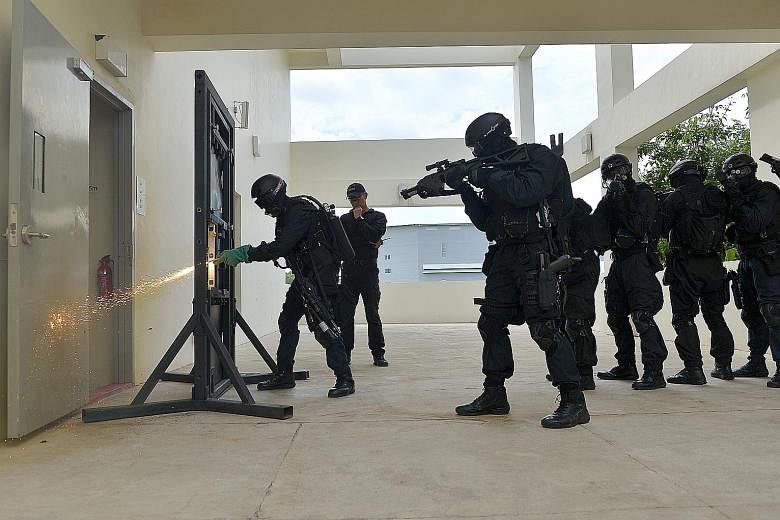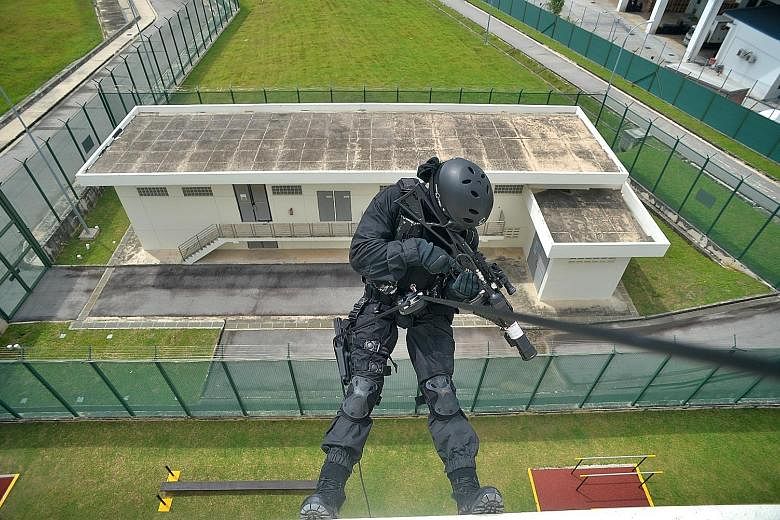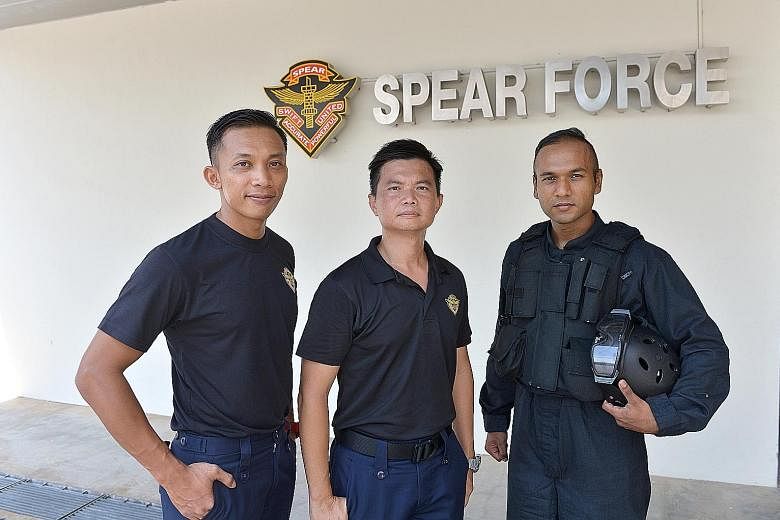Two loud bangs are followed by a cloud of smoke. Moments later, officers swarm in, firing non-lethal guns at rioting inmates and taking control of the situation.
This is when two other inmates came out of their cells, saying they want to surrender.
Not taking any chances, the officers in full operational gear order them to lie on the floor before handcuffing them.
A prison riot - like the one simulated during a recent training exercise which The Straits Times observed - is just one of many scenarios that officers of the Singapore Prisons Emergency Action Response (Spear) Force, based in Changi, are trained to deal with.
Spear, which usually recruits once every two years, is set to welcome seven new officers next month after they complete an intensive five-month course.
Set up in 1990, the elite prisons team tackles emergency security breaches and unrest, and handles scenarios including rioting. Spear officers also escort high-risk inmates when they leave the prisons.
There have not been prison riots here, since the prison riot in 1963 on Pulau Senang, which was used as a penal settlement.
But this "doesn't mean we can be complacent", said Superintendent Ang Kien Tiong, deputy commanding officer of Spear.
"It can work in other ways - precisely because we have a team that is ready, it contributes to the safe and secure custody of the prisons."
Fewer than 10 make the cut for Spear usually, though at least twice as many people apply.
The selection involves three phases: a psychometric test to select those who are able to perform under stressful situations, a physical test and a panel interview.
PHYSICAL TRAINING
Maintaining physical fitness is crucial for Spear officers, who must pass a fitness test every six months in addition to an annual tactical test and Individual Physical Proficiency Test (IPPT).
While all prison officers must pass their IPPT, those in Spear must get a minimum "modified Silver" of 80 points. A normal Silver is 75 points and above. This means the bar is set higher for Spear officers.
Unlike other prisons officers who may be rotated to different departments, Spear officers can stay in the unit for as long as they want, provided they remain fit.
"The more experience they have, the more advantageous it is to this unit," said Superintendent Ang. Some have been with Spear for around 20 years.
Staff Sergeant Mohamed Hafiz Noor Mohamed, 31, one of the seven Spear trainees set to graduate next month, said the month-long conditioning at the start of the five-month training is the most challenging.
Trainees start the day with three to five sets of physical training exercises such as chin-ups. They then do other exercises such as a standard obstacle course involving a low wall and Jacob's ladder, which they must clear in six minutes.
They also do weighted bag training - full operational gear can weigh up to 15kg - and familiarise themselves with Spear equipment.
After this conditioning phase is endurance week, said Staff Sgt Hafiz, where trainees stay in for a week. "At night, we'll be activated again for missions and more physical exercises," he said.
As part of night missions, Spear officers respond to simulated prison emergencies conducted near their base in Changi.
They also have to operate in respirators and undergo confidence tests in low-light situations.
TACTICAL TRAINING
The remaining four months of training are spent on a tactical course designed to make sure officers can perform high-risk operations and handle prison disturbances.
The course includes training in high-risk escorts, close-quarters combat and team dynamics.
Officers are also familiarised with less lethal weapons such as FN303 launchers, said Staff Officer of Spear Doctrine Rohaizad Mohamed Athmad. These launchers fire projectiles aimed at incapacitating someone through blunt trauma, without causing critical injuries.
Officers are trained in using pistols and a modular combat shotgun that can project non-lethal rounds too, with "an impact force almost similar to a baton strike", he added.
Other skills include live firing using lethal weapons and handling pepper spray which is used for scenarios like riot control. Among the scenarios they are trained to handle is riot control.
READY FOR ACTION
Spear officers are put in shifts every day to be on standby to be activated in any of the 13 prisons here. When activated through a siren, their response van, which is loaded with equipment every morning, must leave the base within two minutes.
There are three types of Spear officers. Besides operators who work on shifts and get activated for emergencies or exercises, there are trainers - a select group in charge of training the operators.
There are also officers overseeing tactics and development. Officers get rotated among these duties. "As an operator, most of the day revolves around training," said Superintendent Ang. This also includes rappelling and firearms training.
"Even without any incidents, we go into institutions as a show of force to make our presence felt," he added, declining to reveal the number of prison incidents that Spear is activated for.
"It's important that we have a force that is ever-ready to counter any contingency that might happen in the prisons," he said. "We don't want to wait till something happens one day."




